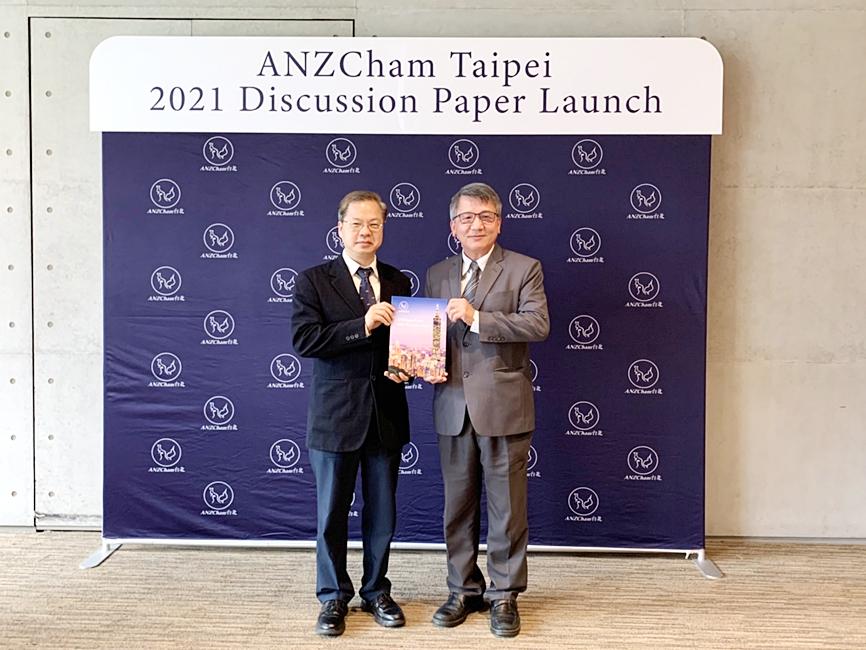Most Australian and New Zealand companies find it difficult to do business in Taiwan given a lack of English proficiency and inadequate digitization, the Australia New Zealand Chamber of Commerce (ANZCham) in Taipei said in its annual discussion paper.
Only 38 percent of respondents said it is easy for a foreign company to enter the local market and do business, compared with more than 50 percent who said they disagreed.
The survey is part of the discussion paper ANZCham released on Tuesday to call for deregulation and strengthening of trade ties between Australia, New Zealand and Taiwan.

Photo: CNA
The chamber welcomed the Taiwanese government’s promotion of a bilingual policy, with respondents saying that information in English is not sufficient and existing systems are not adequately digitized, especially with regard to the banking system.
More than 50 percent of respondents said that laws and regulations are lacking in flexibility and information is not sufficient or clear enough, the survey said.
In particular, 44 percent said there is not enough information on free-trade zones, it showed.
Despite the challenges, 44 percent said the Taiwanese government was receptive and supportive in listening to their operational difficulties.
A large majority, 69 percent, said that foreigners working and living in Taiwan do not have difficulty integrating into the local society, despite the language divide.
Twenty-five percent said it is not easy for expat children to join international schools in Taiwan.
Trade between Taiwan and Australia saw a significant retreat last year due to the COVID-19 pandemic, as evidenced by a 20 percent drop in imports from Australia and flat exports, the paper said.
Things improved a lot in the first half of this year, with imports and exports from Taiwan spiking 48 percent and 30 percent after Australia gradually emerged from the negative impact of the COVID-19 outbreak and lockdowns, it said.
Taiwan’s top exports to Australia include machinery and electrical equipment, base metals and minerals, and gas products, it said.
Australia’s major exports to Taiwan include coal, natural gas and iron ore.
The paper in particular pushed for favorable terms for imports of health support products from Australia, which are currently subject to a 30 percent tariff, putting Australian importers at a disadvantage.
People worldwide have assigned more importance to health and wellness following the COVID-19 pandemic and the endeavor includes using health support supplements, it said.
The 30 percent tariff runs counter to global tariffs imposed on health support goods, which are typically lower than 10 percent, it said.
As the free-trade agreement between Taiwan and New Zealand signed in 2013 “continues to pay dividends,” ANZCham called on Taiwan and Australia to pursue a broad-based economic cooperation agreement.
In addition, ANZCham said it strongly supports Taiwan’s application to join the Comprehensive and Progressive Agreement for Trans-Pacific Partnership trade pact. Taiwan formally submitted its application to join the pact in September, about a week after China.
At the paper’s launch event on Tuesday, National Development Council Minister Kung Ming-hsin (龔明鑫) said the government has worked hard over the past few years to relax regulations.
There is still a long way to go in terms of regulatory reform and deregulation, Kung said, adding that the government welcomes relevant advice from the business sector.
As for calls from ANZCham for Taiwan to ease its border control measures, Kung did not directly address the issue, but said that all parties have the same goal.
Additional reporting by CNA

NEW IDENTITY: Known for its software, India has expanded into hardware, with its semiconductor industry growing from US$38bn in 2023 to US$45bn to US$50bn India on Saturday inaugurated its first semiconductor assembly and test facility, a milestone in the government’s push to reduce dependence on foreign chipmakers and stake a claim in a sector dominated by China. Indian Prime Minister Narendra Modi opened US firm Micron Technology Inc’s semiconductor assembly, test and packaging unit in his home state of Gujarat, hailing the “dawn of a new era” for India’s technology ambitions. “When young Indians look back in the future, they will see this decade as the turning point in our tech future,” Modi told the event, which was broadcast on his YouTube channel. The plant would convert

‘SEISMIC SHIFT’: The researcher forecast there would be about 1.1 billion mobile shipments this year, down from 1.26 billion the prior year and erasing years of gains The global smartphone market is expected to contract 12.9 percent this year due to the unprecedented memorychip shortage, marking “a crisis like no other,” researcher International Data Corp (IDC) said. The new forecast, a dramatic revision down from earlier estimates, gives the latest accounting of the ongoing memory crunch that is affecting every corner of the electronics industry. The demand for advanced memory to power artificial intelligence (AI) tasks has drained global supply until well into next year and jeopardizes the business model of many smartphone makers. IDC forecast about 1.1 billion mobile shipments this year, down from 1.26 billion the prior

People stand in a Pokemon store in Tokyo on Thursday. One of the world highest-grossing franchises is celebrated its 30th anniversary yesterday.

Zimbabwe’s ban on raw lithium exports is forcing Chinese miners to rethink their strategy, speeding up plans to process the metal locally instead of shipping it to China’s vast rechargeable battery industry. The country is Africa’s largest lithium producer and has one of the world’s largest reserves, according to the US Geological Survey (USGS). Zimbabwe already banned the export of lithium ore in 2022 and last year announced it would halt exports of lithium concentrates from January next year. However, on Wednesday it imposed the ban with immediate effect, leaving unclear what the lithium mining sector would do in the